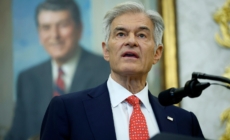-
Trump’s Lust for Desecration - 7 mins ago
-
Airplane windscreen shatters mid-flight en route to Los Angeles - 30 mins ago
-
Medicare Update: Trump Official Dr. Oz Has New Advice for Recipients - 33 mins ago
-
Sean ‘Diddy’ Combs Will Appeal His Conviction and Prison Sentence - 52 mins ago
-
Texas A&M’s Mike Elko Addresses Penn State Rumors - about 1 hour ago
-
George Santos and President Trump’s Theory of Mercy - 2 hours ago
-
Eagles Announce Jalen Hurts Milestone After Vikings Game - 2 hours ago
-
Trump again suggests sending troops to San Francisco. Local officials call it chaos - 2 hours ago
-
Yankees Hall of Famer Calls Dodgers’ Shohei Ohtani MLB’s GOAT - 2 hours ago
-
Appeals Court Ruling Allows Trump to Deploy National Guard Troops to Oregon - 2 hours ago
Kaiser Permanente Workers Begin Strike in California, Oregon and Hawaii
Health care workers at Kaiser Permanente locations in California, Oregon and Hawaii began a five-day strike on Tuesday, seeking better pay, staffing levels and a new collective bargaining agreement.
Over 30,000 members of the Alliance of Health Care Unions joined the picket lines, according to the Associated Press, which reports that the strike could grow up to 46,000 people.
Kaiser Permanente workers say pay has lagged behind regional competitors, leading to turnover and open seats that aren’t filled. The group on strike includes nurses, pharmacists and physical therapists. The union is seeking a 25 percent pay increase over four years, while it was offered a 21.5 percent increase during negotiations.

“Kaiser has failed to meet us at the table, we’ve been negotiating with them for five months and we haven’t come to an agreement. They continually stalled our attempts to come to an agreement with them,” Nancy Bolanos-Rice, 45, a nurse at the company’s Bakersfield, California, location, told Newsweek from the picket lines.
Why It Matters
Based in Oakland, California, Kaiser Permanente is one of the largest health care providers in the country, with a nonprofit health plan that serves 12.6 million people across the United States.
The company will keep clinics and hospitals open during the strike by rescheduling elective procedures, engaging contingent staffers and switching some in-person appointments to telehealth. Bolanos-Rice and others said that often when registered nurses or other providers depart, the position is eliminated, leading to higher patient loads for existing staff.
On October 13, Kaiser Permanente said it will be onboarding over 7,000 “nurses, clinicians, and other staff to work during the strike, the majority of whom have worked at Kaiser Permanente before. In addition, more than 1,000 of our employees have volunteered to be reassigned to work in strike locations.”
What To Know
On October 3, a union representing over 50,000 Kaiser Permanente health care workers announced its intention to strike on October 14, giving 10 days notice to the employer. Their contracts expired on at the end of September and the union, the United Nurses Associations of California/Union of Health Care Professionals (UNAC/UHCP), says that Kaiser has delayed negotiations for a new collective bargaining agreement that have been ongoing for months.
Numerous striking members shared their perspectives in public statements and pointed out that Kaiser Permanente has $66 billion in cash reserves, $22 billion more than it had in 2021.
In a statement to Newsweek, Kaiser Permanente said a strike “would only delay progress, waste millions, cause lost wages, and potentially disrupt care.”
What People Are Saying
Denise Bolanos-Rice, 45, a nurse in Bakersfield, told Newsweek: “We are continually met with rising costs of living. … Some of our partners in the Alliance are making 20 percent less than their counterparts in other areas. … We’re here to do what it takes to win a fair contract. We’re here to stand by our patients and profession.”
Kaiser Permanente said in a public statement at the beginning of the strike: “The Alliance began bargaining seeking a 38% wage increase over 4 years and now demands 25% — a figure out of step with today’s economic realities and rising health care costs. This would dramatically increase the current $6.3 billion annual payroll and lead to higher rates for members and customers, with serious market implications… A strike is unnecessary when a generous offer is on the table. The strike is designed to disrupt the lives of our patients — the very people we are all here to serve.”
The UNAC/UHCP, the striking union, said in a statement: “Kaiser’s public messaging highlights a ‘21.5% wage increase over four years,’ but what it doesn’t mention is years of wage freezes during record inflation, cuts for new union members, and the real daily impact these conditions have on patient care. … This story isn’t just about numbers — it’s about patients, burnout, and a health care system at a breaking point. Kaiser made nearly $13 billion in profit in 2024 and holds $66 billion in reserves, yet refuses to meet reasonable proposals that would stabilize the workforce and improve care.”
Nicole Wooten, RN, a registered nurse in Southern California at Kaiser Riverside, said: “Nurses go home exhausted because we have too many patients to take care of. The shifts are long, the pace never slows, and there’s always one more call light, one more chart, one more medication to give. You move from room to room like you’re on a timer—because you are. … And then, when you finally get to leave, you think about the faces you saw that day—the people you wanted to help more but couldn’t. The patient who was scared and needed someone to sit with them, but you had five other rooms to check.”
Walter Fulgram, a physician assistant/associate at Kaiser Santa Clara in Interventional Cardiology, said: “For almost 15 years, I tried to change things from the inside. I believed that with persistence, collaboration, and a loud enough voice, we could fix the system. And in some ways, we did. But what I kept running into were massive discrepancies: Between departments, between sites … others, especially those in smaller departments… if they weren’t vocal, they got less. If management turned over (and it did, a lot), policies changed on a whim. There was no consistency. No fairness.”
What’s Next
The strike is planned for five days, at which point the union is optimistic Kaiser will be more motivated to come to the negotiating table with a more substantial offer.
Source link

















